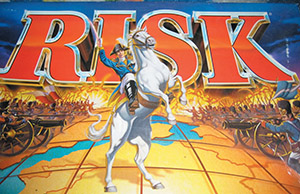
“Can we play Risk?” my son asks me on a Shabbat afternoon. I quickly glance at the wall, unsure of what excuse I can give this time. Usually, I say that I have to take care of our toddler; most games are impossible to play with him around because he generally tries to be included in the activity and ends up ruining it and causing several disappointed children to have tantrums. But our 2-year-old is sleeping; I am at a loss.
“Can you take the Risk down?” he asks. It is on the highest of shelves in our toy closet, buried in the back with other games I hate; Sketchy, Candyland, the Dr. Seuss one where you have to crawl under a foam-rod. They are not easy-to-access, this way the kids won’t ask me to always play. I may have to have another baby so that my toddler-excuse doesn’t run out so quickly.
I bring down the Risk. I actually don’t know how to play, and neither does my son. He tries to coerce me to play his made-up version, but the anarchy he describes sounds even more complicated and hard to follow than an actual game would be, so I dig out the instruction booklet. Actually, it was a book, not a booklet. Like a textbook.
“Okay, so first we’ll divide up the cards,” I say, reading the instructions from the first page. He dutifully follows my directions, and I genuinely try to focus on what follows, but I simply can’t make any sense of the words. I find myself hoping that my youngest child will wake up from his nap, even though I have never wished that before, but I am desperate to get out of the game, without disappointing my son. He hands out hundreds of little battle people, and asks which color I’d prefer? I choose red.
I struggle over the words in the book. I simply don’t know what page I am supposed to turn to next or how to begin the game, but I do notice that we are short by three dice. “I guess we can’t play. We’re missing dice,” I feebly attempt. He is unfazed by this setback and suggests that we borrow from a Monopoly game. Monopoly even seems less daunting than this.
It’s a great moment for us to connect. With both of his sisters out for the afternoon, and his younger brother napping, it is the perfect time for him to get some much needed attention. But I don’t feel I am doing a very good job at it if I am engaged in an activity that doesn’t agree with me. Ideally, I’d like to be napping, too, but since that couldn’t happen, I hunker down.
“Look,” I say, leveling with him. “This is too complicated for me right now, and it seems like it’s a very long game. Let’s pick something simpler and shorter that we can start and finish, and we’ll both have a good time.” For a moment, his eyes are downcast, and I am worried he will ask to play Pokemon cards with me. This is another dead-end, miserable game, and the makers should be shot, but they are probably somewhere in China, so I will never find them. The game has no purpose, and no matter how many times he has tried to explain to me what to do, I can’t process his words. Petrified by the risk that he will force me to play Pokemon, I quickly suggest Connect Four, and he agrees. This game is simple, involves strategy, and is short.
“We’ll play seven times,” he says, and I acquiesce because at this point I am so relieved to not be playing Pokemon or Risk. After four rounds, his little brother wakes up and our playing comes to a quick end, but our laughter and feelings of happiness do not. We both genuinely enjoyed the game and challenged each other, and I am thrilled to have made the switch. I bury the Risk back in the top of the closet, stack the Connect Four on top of it, and hope it is never found again.
Sarah Abenaim is a writer living in Teaneck. She can be reached at SarahAbenaim@gmail.com.
By Sarah Abenaim









